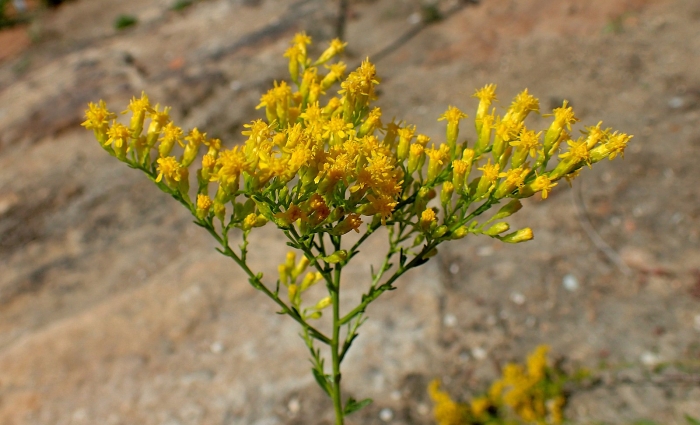Gattinger’s Goldenrod
(Solidago gattingeri)
Gattinger’s Goldenrod (Solidago gattingeri)
/
/

Krzysztof Ziarnek, Kenraiz
CC BY-SA 4.0
Image By:
Krzysztof Ziarnek, Kenraiz
Recorded By:
Copyright:
CC BY-SA 4.0
Copyright Notice:
Photo by: Krzysztof Ziarnek, Kenraiz | License Type: CC BY-SA 4.0 | License URL: https://creativecommons.org/licenses/by-sa/2.0 | Uploader: Kenraiz | Publisher: Wikimedia Commons |






























Estimated Native Range
Summary
Solidago gattingeri, commonly known as Gattinger’s Goldenrod, is a perennial herb that is native to limestone glades and rocky prairies in the Central United States. It typically grows to a height of 3-4 feet and a width of 2-3 feet. Gattinger’s Goldenrod produces numerous small, bright yellow flower heads from late summer to early fall, which are arranged in large, showy arrays at the top of the plant and smaller clusters along the side branches. The plant’s ability to produce up to 250 flower heads makes it particularly attractive when in bloom.
Gattinger’s Goldenrod is valued for its bright yellow flowers that add late-season color to gardens and its adaptability to a range of soil conditions, although it prefers calcareous soils. It is often used in wildflower gardens, meadow plantings, and for naturalistic landscaping. This species is drought-tolerant once established and thrives in full sun, requiring low to medium amounts of water and medium-drained soils. While it is not commonly afflicted by serious pests or diseases, powdery mildew and rust can occasionally be problematic. It is also important to note that while goldenrods are often blamed for hay fever, they are not the true culprits; that distinction belongs to wind-pollinated plants like ragweed.CC BY-SA 4.0
Gattinger’s Goldenrod is valued for its bright yellow flowers that add late-season color to gardens and its adaptability to a range of soil conditions, although it prefers calcareous soils. It is often used in wildflower gardens, meadow plantings, and for naturalistic landscaping. This species is drought-tolerant once established and thrives in full sun, requiring low to medium amounts of water and medium-drained soils. While it is not commonly afflicted by serious pests or diseases, powdery mildew and rust can occasionally be problematic. It is also important to note that while goldenrods are often blamed for hay fever, they are not the true culprits; that distinction belongs to wind-pollinated plants like ragweed.CC BY-SA 4.0
Plant Description
- Plant Type: Herb
- Height: 2.5-4 feet
- Width: 1.5-2.5 feet
- Growth Rate: Moderate
- Flower Color: Yellow
- Flowering Season: Summer, Fall
- Leaf Retention: Deciduous
Growth Requirements
- Sun: Full Sun
- Water: Low, Medium
- Drainage: Medium
Common Uses
Bee Garden, Bird Garden, Butterfly Garden, Deer Resistant, Drought Tolerant, Hummingbird Garden, Low Maintenance, Rabbit Resistant, Rock Garden
Natural Habitat
native to limestone glades and rocky prairies in the Central United States
Other Names
Common Names:
Scientific Names: , Solidago gattingeri, Solidago missouriensis var. pumila, Aster gattingeri,
GBIF Accepted Name: Solidago gattingeri Chapm. ex A.Gray